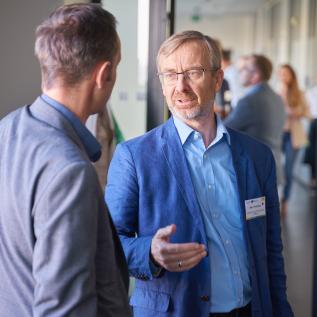Biowaste management and tariff systems in the Region of Coimbra
On 5-6 March 2025, the Policy Learning Platform held an onsite peer review for the CIM Regiao de Coimbra, which requested advice regarding their policy challenge on how to set up and effective biowaste management, including the use of tariff systems.
Region of Coimbra wanted to tackle the following challenges:
Peers from across Europe
Alongside Magda Michaliková and Katharina Krell, our Thematic Experts for a Greener Europe, six excellent peers participated in the peer review:
- Andrius Jučas, Alytus Region Waste Management Center, Lithuania
- Steffen Walk, European Compost Network, Germany
- Kristel Vandenbroek, Vlaco Flanders, Belgium
- Filipe Carneiro, LIPOR, Portugal
- Susana Freitas, LIPOR, Portugal
- Vera Melo, Cascais Ambiente, Portugal
Recommendations
Portugal and Coimbra Region currently have very low rates of separate biowaste collection, with most organic waste still ending up in the residual waste stream sent to landfill. In 2022, in Coimbra Region 63% (ERSUC) and 79% (Planalto Beirão) of the municipal waste went to landfill. Increasing biowaste collection is crucial to reduce the organic matter going to landfills and enable its valorisation into compost and biogas. Coimbra Region municipalities know that there is a strong need to change the paradigm on waste management to reach the ambitious national and EU targets and objectives. The municipalities have adopted Action Plans to this end, and started several initiatives in their teritorries. To achieve the presented policy targets, the peers recommended the following:
- Together design a territorial strategy and a governance model
- Simplify the organigram – (too) many players and responsibilities
- Have all the stakeholders around the table and everyone on board, establish regular meetings and better cooperation between municipalities and high-level entities
- Take stock of the existing initiatives and build a Coimbra-region strategy on top
- Develop a roadmap
- Make food waste sorting mandatory
- Group areas together and see which areas could have a unified system
- 52% of the population concentrated in 18% of the territory – they could have a joint collection systems
- Home / community composting for the other dispersed areas, at least in the beginning
- A collection system needs to be compatible with future PAYT – either door-to-door or street containers with an access card
- At the beginning of separate collection, easy-to-handle systems should be applied that can be expanded rather easily before setting up a complex system
- Minimum level of service should always be included in the fee, even in a PAYT scheme
- Fee for residual waste should be significantly higher than fee for separated streams
- Food waste should be collected more often that residual waste
- As an intermediate step have a flexible fee for residual waste: it is faster to implement and easier to manage than full PAYT and helps in planning for PAYT based on actual needs of people
- Use the time before PAYT implementation to balance the cost recovery of collection systems and manage citizen expectations
- Make it easier to sort biowaste in comparison to residual waste
- Awareness raising campaigns: continuous, ambitious communication campaigns are crucial
- Use targeted communication and all communication channels
- Conduct workshops, trainings and info sessions
- Financial incentives – PAYT on residual waste
- Education in schools, kindergartens
- Food waste prevention initiatives
The host’s policy challenges, and all the peer suggestions can be found in the follow-up report below.
The peer review highlighted the importance of innovative approaches to biowaste management, particularly the implementation of Pay-as-you-throw (PAYT) and biowaste selective collection and treatment at source (home, community and central composting). These strategies have shown remarkable potential in reducing residual waste and increase recycling rates, as evidenced by the success stories and good practices showed during the event.

Peer review publication
Find more information on the methodology and experiences of previous beneficiaries in our publication.

Apply for a peer review
Start your peer review application process today and find solutions to your policy challenge with our expert and peers!
